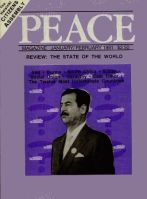
Peace Magazine Jan-Feb 1991, page 6. Some rights reserved.
Search for other articles by Dietrich Fischer here
When Saddam Hussein attacked Iran in 1980, the world hardly even condemned that clearest act of aggression since World War II. That grave mistake has come back to haunt us.
Acquiescing again to Iraq's aggression against Kuwait would not buy us peace, but only encourage more aggression in the future, as the experience of the 1930s has shown. But Saddam Hussein's crime does not justify committing an even bigger crime by carpet bombing Iraqi cities. How can war be avoided without yielding to aggression?
The psychologist Morton Deutsch has concluded from extensive studies that the most effective way to deal with dangerous criminals is to be firm, but calm and nonbelligerent, neither to yield to their threats nor to push them into a corner.
The sanctions adopted by the U.N. Security Council were an important step. It would have been a terrible mistake to reward Iraq's aggression by buying Kuwaiti oil from it. That could have invited a whole series of future wars over resources.
Many argue that if the sanctions don't "work" soon, in the sense of forcing Iraq to withdraw from Kuwait, it will be necessary to resort to military force. But the sanctions do work already in the more limited sense of punishing Iraq. Iraq gained nothing from its aggression, but is worse off than before.
When Stalin imposed a series of Soviet client regimes in Eastern Europe, the West did not "roll back the iron curtain," as some advocated. That could have led to World War III. The policy of containment prevented further Soviet expansion for forty years. In time, a new leadership in the Soviet Union shifted course, preparing the way for the democratic revolutions in Eastern Europe in 1989. The same policy seems appropriate to deal with Iraq.
Many argue that the American people will not have the patience to keep 300,000 troops in the Saudi desert longer than a few months. Yet even larger U.S. forces remained in Western Europe for four decades without fighting a war. Furthermore, the largely American force should be replaced by a truly multinational defensive force under U.N. command.
Iraq's effort to build nuclear weapons and long range missiles poses a growing threat not only to its neighbors, but to the entire world. It must be stopped before it is too late. The nuclear Non-Proliferation Treaty should be declared mandatory even for non-members. If Iraq refuses international inspections to ensure that it does not build nuclear weapons, it may be necessary to destroy its nuclear facilities.
Demanding that Iraq and other nations accept the Non-Proliferation Treaty would be greatly facilitated if the United States adhered to its obligations under the treaty to work toward nuclear disarmament, by concluding a Comprehensive Test Ban Treaty. If the Bush administration maintains its short-sighted refusal to adopt a Comprehensive Test Ban, the Non-Proliferation Treaty may not be extended beyond its current expiration date in 1995. Can humanity survive in a world full of unstable governments with nuclear weapons?
To maintain stable peace, it is necessary to remove sources of grievance that breed conflict. If two nations share the same oil field, like the Rumaila oil field crossing the border between Iraq and Kuwait, this almost inevitably leads to disputes. That situation can be corrected without yielding to Iraq's aggression. Iraq can be offered the entire oil field, and the islands of Warba and Bubiyan that control Iraq's access to the Persian Gulf, if it cedes to Kuwait equivalent oil fields and territory elsewhere and compensates Kuwait for the damage it inflicted during the invasion. Such a plan could offer Iraq a face-saving way out, without rewarding its aggression.
A peace plan should also foresee democratic elections under U.N. supervision, not only in Kuwait, but especially in Iraq.
To defuse another source of tensions in the region, the Arab-Israeli conflict needs to be solved. Such efforts began long before Iraq's invasion of Kuwait, and should not be abandoned now simply because Saddam Hussein has sought to make a withdrawal of Israel from the West Bank and Gaza a precondition for his withdrawal from Kuwait. A peace conference addressing all the conflicts in the Middle East should be convened, not as a concession to Saddam Hussein, but in its own right. Gorbachev proposed such a conference long before Iraq's invasion of Kuwait.
The peace-loving nations of the world must neither condone aggression, nor allow themselves to be provoked into aggression. They ought to do what is just and fair and not sink to the level of Saddam Hussein.
Dietrich Fischer, a Professor at Pace University, is author of Preventing War in the Nuclear Age and co-author of Winning Peace and Warfare and Welfare.
Peace Magazine Jan-Feb 1991, page 6. Some rights reserved.
Search for other articles by Dietrich Fischer here